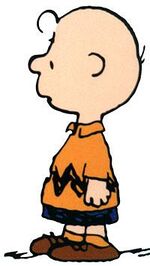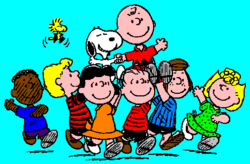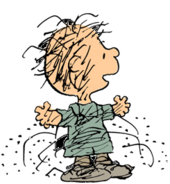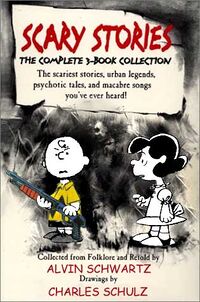Charlie Brown
“Good Grief... a Charlie Brown Uncyclopedia page!”
Charles Liebowicz (born October 2, 1950), more widely known as Charlie Brown, was the leader of the notorious Peanuts gang for over forty years. Under Brown's leadership, the gang was responsible for dozens of gory murders, hundreds of terrifying robberies, a traveling cooking show, and seven gruesome television specials.
Childhood[edit]
Young Charles was born on October 2, 1950. Not much is known about his parents, except that they weren't around very much for him. And they had a speech impediment. This, combined with progeria, a common disease which made him bald by the age of 5, resulted in severe bouts of depression. Another cause of this, or perhaps a result, was his constant feeling of social isolation. Some psychologists interested in his case have pointed out that while there were many children around him, they could never be considered "friends," as they constantly made fun of and threw rocks at him. His depression worsened when he was informed that he would be a prepubescent bald kid for the rest of his life.
One such child was Lucy van Pelt, who, among other things, constantly tricked him into trying to kick a football she was holding, and then she'd pull it away at the last minute, and then he'd fly up into the air and land on his head causing damage to his skull, and then everyone would laugh. The sheer amount of times this happened could have easily contributed to Charles' murderous techniques in the future, as his autopsy revealed that the social interaction section of his brain had been almost entirely demolished.
Revenge[edit]
Around 1964, the body of Lucy van Pelt, now a teenager, was found at the base of a cliff in a forested area near her home. It appeared that she had not noticed the cliff and had been shoved jogged off it by accident. Authorities searched the area for evidence of foul play, and found only a deflated football on the rocks from which she had fallen. DNA evidence proved that Liebowicz had handled the ball. On the same day the body was found, Liebowicz vanished, never to be seen again, until he was seen again a few days later.
A Life of Crime[edit]
After murdering Lucy, Liebowicz, who at this time began calling himself "Charlie Brown", went into hiding. No one knew where he was, especially not his alleged next victim. She was discovered in a field in North Dakota. She had been dead for a long time before her body was found, because no one lives in North Dakota. Therefore, her remains had very little remaining, although her hair was mysteriously left intact. Because of this, positive identification took quite a while, but the sensationalist newspapers of the 1970s needed a name to call her. They dubbed her The Little Red-Haired Girl, or "Heather".
After that, Brown apparently decided that murdering people was passé and gave it up for a while. Instead, he started robbing liquor stores, presumably because he was very thirsty. His rash of liquor store robberies spread like a rash from Maine to California. His decline only came in the late 1990s, as heavy cocaine use interfered with his ability to effectively run the gang. He was found dead from bullet wounds on February 13, 2000.
The Gang[edit]
Charlie Brown's exploits had earned him notoriety. Soon, other shady individuals began tracking him down, and requested to join him in his adventures. After not too long, quite a few people had joined the gang, which was originally known as The Charlie Brown Gang. Many members felt that this name did not adequately reflect their individual contributions and petitioned Brown to change the name. Then Brown saw some peanuts on the ground and said, "Hey, let's call ourselves the Peanuts Gang!" Everyone thought this was a great idea, because there were few smart gang members, and there was much rejoicing.
Some of the more famous members included:
Sally Brown[edit]
Known chiefly for her puff of yellow, or perhaps blonde hair. She took the name Brown as a tribute to Charlie Brown, not knowing it wasn't really his last name. When she found out his real name, she decided to continue being Brown, because she didn't want to be all wishy-washy. She was responsible for the murder of seven fat people in rural Indiana, as well as a handful of other mischievous doings. Her life of crime began when she was serving as a waitress in a small diner in Indiana. One day, a customer came into the diner and tipped poorly. Sally felt that the only reasonable reaction would be to murder everyone in the diner, and acted accordingly. Ironically, the man who tipped poorly escaped, ran into the parking lot, and was hit by a trucker pulling in. Sally commandeered the truck, and did not even have to use violence. She simply asked. Apparently, the driver had a soft spot for young, blonde, blood-soaked children. Sally joined up with Charlie, and the rest was history.
Linus van Pelt[edit]
Since Sally had already taken Brown's name, Linus decided to use the name of Brown's first victim. First alleged victim, that is. Linus was one of the more "off color" members of the gang. Hostages described him as carrying a blanket around with his left hand, sucking on his thumb with his right, and shooting people with his middle. He sure liked shooting people. He often talked about following a mysterious mob boss known as "The Great Pumpkin", although many other gang members suspected that this was actually a delusion of his fragile mind. It was later discovered that there actually was a giant Pumpkin to pray to, and Linus soon became the leader of His infamous cult. Linus also fathered a child with Sally Brown. The child grew up to be New York Giants linebacker Brad van Pelt, and inherited a host of psychological problems from his parents.
Snoopy[edit]
A rapping dog often seen in the company of the gang. There have been no crimes specifically attributed to him, but authorities know he must have done something, since rappers are always arrested, either framed or being snitched on. As a group member, Snoopy was often used for transportation, though he was often so strung out on something-or-other that he attempted to fly his little red doghouse. Unfortunately, the doghouse would have violated every single law of aerodynamics, and never flew, but he still liked to pretend. He called himself "the Red Baron", presumably due to the color of the doghouse.
Peppermint Patty[edit]
Strangely enough, Patty was the only member of the gang who used her real name. She must have thought it sounded "dangerous" enough. The lack of an interesting fake name was made up for by the numerous interesting illegal things she did. The most famous was the 1982 attempted robbery of a San Francisco bank, in which she kicked open the door, fired several rounds into the air, and was promptly arrested by the seven police officers in the bank cashing their pay checks. In 1971 she was knighted by Queen Elizabeth, who mistook her for a male. This confusion is shared by her lesbian lover, Marcie, who in addition to believing Patty is actually male, (though still aroused by her) is one of very few people who are aware of Patty's knighthood and is constantly calling her "sir," respectively. Some believe that Marcie may be having an affair with Charlie Brown.
Pig Pen[edit]
Pig Pen got his name after committing the famous Barnyard Slaughter, which left 2 farmers, 11 chickens, 1 cow, and 4 pigs dead. His mind is as dirty as he is; the residue his murders leave behind are never fully washed away. His mind is haunted day and night, and yet he considers it to be a figment of his imagination and doesn't relent. His sanity is always questioned, as his paranoid delusions and disassociation from reality generally have devastating effects on those around him.
Schroeder[edit]
Forbidden lovechild of John Williams and Barbara Streisand, L'il Beethoven was shoved into an existence of mixed bastardly and musical life. Forced into seclusion by his secretive parents, he was unable to have a normal childhood. He released his random bursts of rage by banging the keys of his piano during frequent, seemingly unprovoked fits of anger. Mastering classical and Baroque piano music at an early age, he was sure to be a star, if his parents weren't too embarrassed of their relationship. After growing up, he performed acts of revenge against society, Sweeney Todd style, randomly slitting many peoples' throats as they came to his piano recitals. His victims, though usually mortally wounded, often used their last breaths to praise Schroeder's style and elegance, exaggerated by his ability to play even while attacking his victims. Despite this talent with multi-tasking, Schroeder could never quite rub his belly and pat his head at the same time.
As he was going through his late teenage years, he met the ever-so-annoying Lucy Van Pelt, who found him quite attractive. He became her boyfriend soon after. After going through an argument of some kind, possibly her proclaiming something unflattering about Beethoven, Lucy broke up with him. It is then when, in one of his fits of rage, Schroeder gave the location of Ms. Van Pelt to Charlie, who nearly achieved his long-awaited revenge. Even though Charlie failed, he and Schroeder found lots in common with each other, and the two play poker every other week on Tuesday nights.
Semi-retired now from gang life, Schroeder currently offers private piano lessons at his home. Among his more successful students were Thelonius Monk, Chico Marx, Helen Keller and Daniel Barenboim. Elton John, also a former student, once said of his famous teacher, "He could have been the next Victor Borge if he had wanted to."
Franklin[edit]
Although Franklin had no proven connections to any robberies, shoot-outs, or drug-dealing of any sort, the authorities arrested him and consider him part of the gang for three reasons:
- His house was located in the general vicinity of Linus Van Pelt's. Something was up.
- He was black. Obviously within the criminal classes.
- During the raid on his house police discovered a complete first edition set of the works of Charles Dickens. At his trial, Franklin claimed that he did not own a first edition David Copperfield. He maintained that the police had planted one on his shelf.
Under overwhelming evidence, the court found Franklin guilty of gang-related activities and sentenced him to death through forcing him to watch reruns of Three's Company on TV Land and pornographic She-Hulk transformations on YouTube.
Media[edit]
Television[edit]
Several television specials were made in the '60s and '70s about the Peanuts gang's activities, directed by Quentin Tarantino. Although known for his excessively violent films, Tarantino decided that, to respect the dead, the tragic real-life events would be given a whimsical spin. Only one of the specials (They're All Dead, Charlie Brown, and You Killed Them) was too dark to be released.
Famous Charlie Brown specials include It's the FBI, Charlie Brown; It's Your Faustian Bargain, Charlie Brown; Stop! It's Illegal in All 50 States, Charlie Brown; Drop the Weapon, Charlie Brown; It's the Final Solution, Charlie Brown; You're a Sick Fuck, Charlie Brown; and It's Amusingly Out of Character, Charlie Brown.
Books[edit]
In 1971, a book series was released titled Charlie Brown's A String of Misfortunate Occurrences. In the books, Charlie Brown and the rest of Peanuts gang find themselves in dangerous or scary situations, very similar to ones that many children find themselves facing each day. The goal of the series was to present potentially troublesome situations to children and through humor, arousal, and intimidation, teach them to avoid or handle the same situations should they be confronted with them.
The five books were titled Charlie Brown Meets Simon the Brown, Charlie Brown and the Kooky Coach, Linus Learns the Hard Way, Watch Out Lucy, Schroeder Can Sue, and 64 Things You Should Never Do with a Raccoon. The books were controversial, banned in schools, and denounced by religious groups.
Comics[edit]
Charlie Brown comics, titled Peanuts (as if the Peanuts gang were more important than Brown himself in a historical context), were written by Alvin Schwartz and illustrated by Stephen Gammell. The comic strip was a smash hit, despite being about a deranged serial killer.
Reception[edit]
The reaction of the general public to the crimes committed by Brown and his gang was initially negative. Apparently, Brown didn't deserve a little thing called "the benefit of the doubt". You know, it's funny, you kill 1 or 2 hundred people, and suddenly you're the bad guy.
However, as the years went on, nostalgia grew for Charlie. Readers sympathized with his plight to kick the football, and his crushed hopes and dreams. Lee Mendleson, in his book Charlie Brown and Charlie Schulz, described Brown as "a wonderful boy who proved that being a loser could be the biggest success story of all." We're not making this up.
Nevertheless, the legacy of Charlie and his gang's brutal slaughters and other street crimes will always be remembered for what they were: not very nice.






